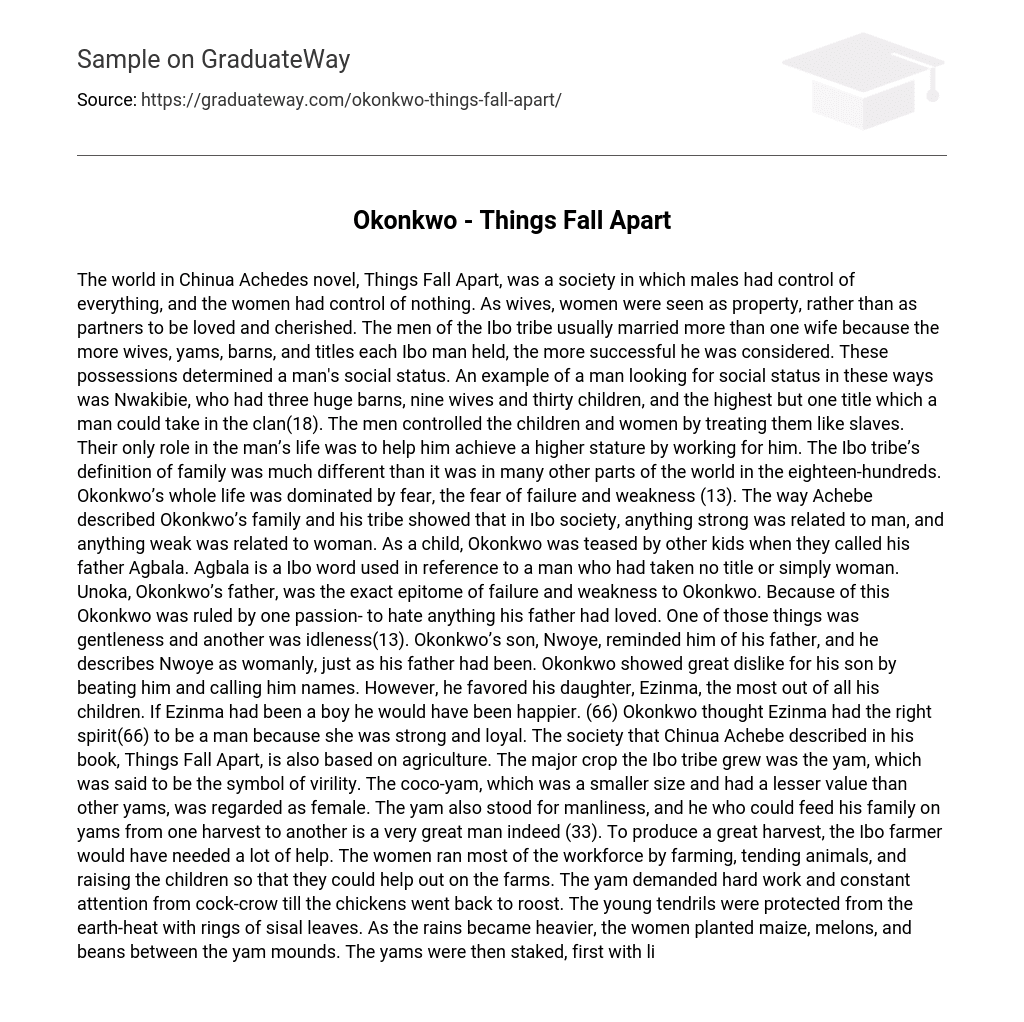The society depicted in Chinua Achebe’s novel, Things Fall Apart, was one where men held dominion over everything while women had no power.
In the Ibo tribe, women were considered possessions rather than beloved partners. It was common for men to have multiple wives, which symbolized their success. A man’s social standing relied on his possessions, including wives, yams, barns, and titles. For instance, Nwakibie aimed to elevate his status by acquiring three substantial barns, nine wives, and thirty children. Additionally, he held one of the highest clan titles (18). Men exerted control over both children and women, treating them as if they were slaves. Their sole purpose in a man’s life was to assist him in attaining higher status through their labor.
In the 1800s, the Ibo tribe had a unique perception of family compared to other regions. Fear consumed Okonkwo’s existence, primarily due to his anxiety of being seen as a failure or weak (13). Achebe’s portrayal of Okonkwo’s family and tribe exemplified how strength was associated with masculinity, while weakness was attributed to femininity within Ibo society. During his childhood, Okonkwo endured taunting from fellow children who derisively labeled his father as Agbala.
In the Ibo language, the term “Agbala” is used to describe someone who lacks any title or a woman. Okonkwo’s father, Unoka, personifies failure and weakness in Okonkwo’s perspective. Consequently, Okonkwo harbors an intense hatred for anything his father valued, including gentleness and idleness(13). Nwoye, Okonkwo’s son, resembles his father and exhibits behavior that Okonkwo associates with femininity, much like his father.
Despite Okonkwo’s harsh treatment and verbal insults towards his son, he had a clear favoritism for his daughter, Ezinma, over all of his other children. Okonkwo believed that if Ezinma had been born male, he would have been happier. He respected Ezinma’s strength and loyalty, seeing her as embodying the traits usually associated with masculinity.
In his book, Things Fall Apart, Chinua Achebe portrays a society that is primarily dependent on agriculture. The main agricultural crop cultivated by the Ibo tribe is the yam, which is considered a symbol of masculinity. Conversely, the coco-yam, a smaller and less valuable variety of yam, is associated with femininity. The yam is also equated with strength, and a man who can sustain his family solely on yams from one harvest to another is highly esteemed (33). To achieve a bountiful harvest, the Ibo farmer would have required considerable assistance.
The majority of the workforce was comprised of women who were responsible for farming, taking care of animals, and raising the children in order to enlist their assistance on the farms. The yam crop required relentless effort and dedicated attention from dawn till dusk. The delicate young shoots were shielded from the scorching heat of the ground using protective rings made from sisal leaves. As the rainfall intensified, the women also sowed maize, melons, and beans amidst the yam mounds.
The yams were supported using small sticks initially and later using large tree branches. The women cultivated the farm three times at specific intervals while the yams grew, not too early and not too late (33). These women can be likened to slaves as they performed the majority of farm labor, yet their significance was not recognized or acknowledged. They were compelled to endure arduous tasks over lengthy durations or faced punishments.
Women in this androcentric society had no freedom or choice. Their husbands controlled their actions, and failure to comply resulted in physical abuse. The tribe believed that a man’s ability to govern his women and children was crucial for his manhood (53). The novel portrays two occasions when Okonkwo physically assaults one of his wives to assert his authority. One incident occurred when she failed to come home and prepare his meal because she was visiting a friend; he then subjected her to severe beatings. Another instance involved her using leaves from a banana tree to wrap food, leading to him inflicting harm upon her. She narrowly escaped death after uttering words about ineffective guns (38-39).
Okonkwo’s treatment of women and wives may stem from an unconscious fear of displaying love or concern, which would be viewed as a sign of weakness. Within the Ibo tribes, there is a strong emphasis on masculinity, leading to stereotyping, gender discrimination, and violence. Consequently, these societal norms result in an unjust portrayal of women. However, there are exceptions to this mistreatment, specifically in the case of revered female figures such as Chielo, the priestess of the Oracle of the Hills and Caves mentioned in this novel. Chielo possesses the ability to transform from her ordinary form and confront Okonkwo directly, even resorting to screaming curses at him. In fact, she issues a warning to him by asking if a man should voice his opinions when a God is speaking. Thus, Okonkwo becomes powerless when faced with the authority of a goddess’s priestess.
He experiences feelings of insecurity due to her gender, which leads him to possess a stronger desire to exert control over women. History Essays





